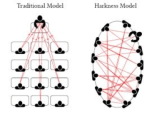
Harkness Table
I was reflecting on my experience with architecture students at University of Ferrara and LEGO SERIOUS PLAY. [See the video]
I find amazing how students who did not have any clue about the content and the goals of the workshop engaged in the discussion and raised a number of enlightening ideas about Heritage. They were not asked, neither provided, any books or papers to read, the idea was to understand how a bunch of students in their early-twenties could theorise and think about Heritage independently, critically and collectively.
So, in my research about educative approaches that capitalise on collaboration and collaborative meaning-making, I’ve found about the Harkness Table. For those who are not familiar with it, this is an educative approach introduced in 1931 when Edward Harkness, a philanthropist, challenged Exeter University asking them to innovate education and provided them with an oval table. The idea behind the table, which was meant to allow 12/15 students to sit around together with their teacher, was to create a different approach to education where students were seen as a team and could be encouraged to take part to a discussion, interact and learn about collaborative practices, by reducing the influence of the teacher.
The idea of a class as a team that capitalises on teamwork and encourages interaction among students in a free environment sounded a pretty close approach to that I adopted. The Harkness Table focuses a lot on these concepts, and I’ve found it thrilling. Though the more I read about it, the more the differences emerged.
read more »





